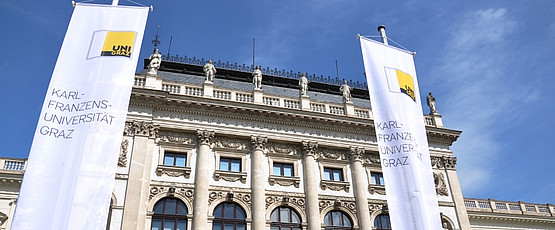Incoming

The University of Graz, which was founded in 1585, is Austria’s second oldest university and one of the largest in the country. Many excellent scientists, amongst them six Nobel laureates, have taught and researched here. With some 32,000 students and 4,000 employees the University of Graz contributes significantly to the vibrating life of the Styrian capital. Its location in Europe encourages a lively scientific, economic and cultural exchange with South-East Europe, from which not only the city benefits, but also its educational institutions.
The Institute of Philosophy of the Faculty of Humanities was founded in 1897, but the teaching of philosophy (logic, natural philosophy, and metaphysics) started as early as 1586 when a Jesuit School was established in Graz. After a strong emphasis on phenomenological theory in the late 19th and early 20th centuries, and analytical philosophy in the late 20th century, the focus widened to include practical philosophy and a humanities-wide interdisciplinary perspective about a decade ago.
As a core offering, regular Institute of Philosophy modules to be open to ELAN students include
From the BA Philosophy
- Module B: Systematic and historic foundations (Introductions to epistemology, ethics, and the history of philosophy)
- Module D: Further disciplines of practical philosophy (value theory, applied ethics, social philosophy, political philosophy, philosophy of religion, aesthetics)
- Module E: Foundations of the History of Philosophy
- Module F: Inter- and transdisciplinary modules (Philosophy and the humanities, philosophy and other sciences, extensions of practical philosophy including phenomenology, history of science)
- Module G.2 and &.3: Advanced courses on practical philosophy and history of philosophy
Here you can find a list of all courses sorted by the modules of the BA curriculum.
From the MA Philosophy
- Module 2: Practical philosophy
- Module 3:Philosophy of philosophy and applications of philosophy
- Module 4: History of philosophy
Here you can see a list of all courses sorted by the modules of the MA curriculum.
From the MA PELP (Political, Economic, and Legal Philosophy)
- Module 1: Political philosophy and legal philosophy
- Module 2: Ethics and theories of justice
- Module 5: Interdisciplinary topics (Practical philosophy and law and politics, practical philosophy and economics and the social sciences)
- Module 6: Methods of the social sciences and normative theory
Here you can see a list of all courses sorted by the modules of the PELP curriculum.
Due to the existence of free elective courses (“Wahlfächer”) the topics of which can be relatively freely chosen, there is a vast amount of other classes from other parts of the humanities and social sciences potentially open to ELAN students.
